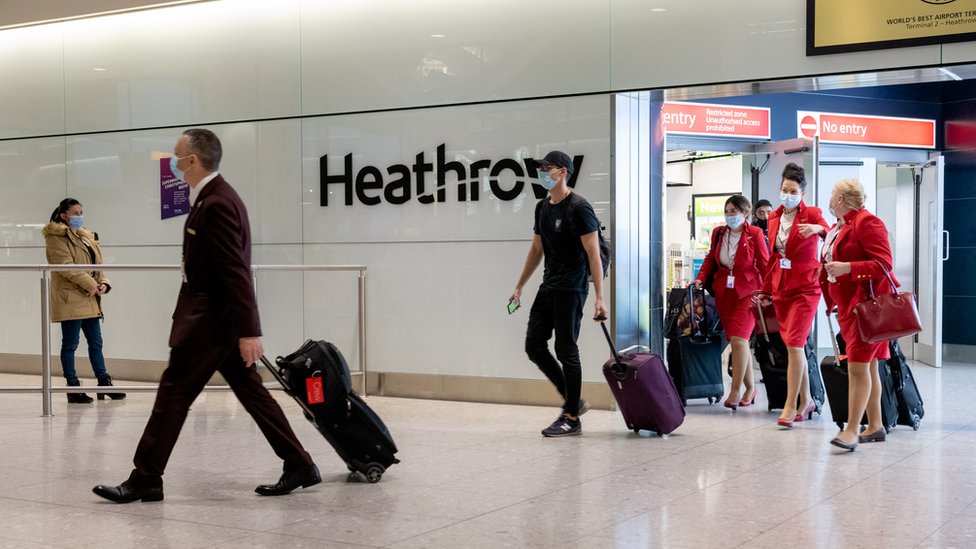Covid: UK's ban on South America travellers comes into force

The UK's new travel ban - which also applies to Portugal and Cape Verde - came into force at 04:00 GMT on Friday.
Like the variants that were first spotted in the UK and South Africa, it is thought the Brazil variant could be more contagious.
It comes as a further 1,248 people with coronavirus have died in the UK.
Latest
government figures on Thursday also showed another 48,682 new cases had been reported.Meanwhile, the number of people in the UK to have received the first dose of a vaccine is now approaching three million.
The UK's new travel ban applies to people who have travelled from, or through, the South American countries of Argentina, Brazil, Bolivia, Chile, Colombia, Ecuador, French Guiana, Guyana, Paraguay, Peru, Suriname, Uruguay and Venezuela in the last 10 days.
It also applies to Portugal - because of its strong links to Brazil - and the former Portuguese colony of Cape Verde off the coast of west Africa, as well as Panama in central America.
However, British and Irish citizens and foreign nationals with residence rights are still allowed to return - but must isolate for 10 days.
Also exempt are hauliers who are travelling from Portugal to transport essential goods.
Brazil has seen more than 200,000 deaths and there is concern about the impact the new mutation could have on its health system.
However, the UK's travel ban was prompted by fears of how quickly the new variant could spread through the region - since Brazil borders 10 countries.
Transport Secretary Grant Shapps has said the ban is "precautionary", adding he "can't provide an end date" to the new rules.
Because holidays are not currently allowed, Mr Shapps said he did not "expect a large number of Brits to have jaunted off to South America", and the government was "not expecting to see a big repatriation issue as a result".
One family, who live in Wolverhampton, told the BBC they feared being stuck out in Brazil.
"I don't know if the government will organise flights," said Jon Dent, 31. He and his wife Carla travelled to the Brazilian city of Goiania in October to introduce their baby daughter to Carla's family.
"I think it's a long shot," he said. "I hope we can get home and not be stranded out here for months. We've got to be patient but at the same time flexible."

Earlier this week, Prime Minister Boris Johnson said he was "very concerned" about the Brazilian variant of the virus.
Many countries imposed travel restrictions after new variants of Covid-19 were identified in the UK and South Africa.
Several Central and South American nations - including Brazil - had already restricted travel from the UK before the latest ban on arrivals.
There is currently no evidence to suggest that any of the variants cause more serious illness, and scientists are confident that vaccines should work against them.
According to Felipe Naveca, deputy director of research at the Brazilian state-run Oswaldo Cruz Foundation, the new variant's origin was "undoubtedly" from the Amazon region.
He told the BBC's South America correspondent Katy Watson the new variant showed some of the same mutations as the UK and South Africa variants - and "some of these mutations have been linked to increased transmission and that is of concern".

- LOOK-UP TOOL: How many cases in your area?
- LOCKDOWN LOOK-UP: The rules in your area
- TESTING: How do I get a virus test?
- SYMPTOMS: What are they and how to guard against them?

Mr Shapps also announced which countries were being removed from the UK's travel corridor list, meaning arrivals from those places will need to self-isolate. They are: Chile, Madeira and the Azores, Aruba, Qatar and the Caribbean islands of Aruba, Bonaire, Sint Eustatius and Saba.
Meanwhile, France has cracked down on the type of tests that travellers can take to show they are negative.
From Monday, travellers will need to show a negative PCR test. Antigen tests - which are the rapid lateral flow tests - will no longer be accepted.
Lorry drivers have been using rapid lateral flow tests to cross the border from the UK into France.
From Monday, everyone travelling to England and Scotland will also have to show proof of a negative test. Wales and Northern Ireland are expected to announce their own plans in the coming days.

- LOCKDOWN LEARNING ON BBC IPLAYER: BBC Bitesize is here to help with your homeschooling needs
- IN NEED OF A NEW SERIES TO BINGE IN LOCKDOWN?: The Serpent is a twisting, real-life story of a murderer, thief and seductive master of disguise


January 15, 2021 at 05:01PM
https://www.bbc.co.uk/news/uk-55671656
Labels: BBC News

0 Comments:
Post a Comment
Subscribe to Post Comments [Atom]
<< Home